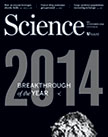 Back in May, we reported on a retraction from Molecular Cell that referred to a 2012 study the same group had published in Science. (A few weeks later, the lab head told us just how painful the process was.)
Back in May, we reported on a retraction from Molecular Cell that referred to a 2012 study the same group had published in Science. (A few weeks later, the lab head told us just how painful the process was.)
Now, the Science paper has been retracted. Here’s the notice:
In our Report “Polymerase exchange during Okazaki fragment synthesis observed in living cells” (1), a collaboration between the Allemand and Michel labs, we performed single-molecule microscopy experiments to describe the replisome dynamics during replication in Escherichia coli. We deduced polymerase exchange from the variation of spot intensity with time, interpreted as specific DNA binding and unbinding of fluorescently tagged components of the replisome. Our recent attempts to repeat these experiments have failed, and we now realize that several issues invalidate the original analyses, including sampling errors, skewed statistical analysis, and miscalculations. The real ratio of significant replisomes (two distinct replisomes per cell) is much less important than stated in the Report, whereas the background (spots due to unbound proteins) is higher. We therefore retract the Report. We apologize to the scientific community for any loss of time and resources caused by this publication.
The paper has been cited 29 times, according to Thomson Scientific’s Web of Knowledge.
Hat tip: Jean Hazel Mendoza
There are queries at PubPeer about figures in two Science papers.
Binding of DCC by netrin-1 to mediate axon guidance independent of adenosine A2B receptor activation
E Stein, Y Zou, M Poo, M Tessier-Lavigne, Science, 291 (2001)
https://pubpeer.com/publications/59C3359E71EED451E01AF46CFDC0BC#fb37969
http://www.sciencemag.org/content/291/5510/1976
Hierarchical Organization of Guidance Receptors: Silencing of Netrin Attraction by Slit Through a Robo/DCC Receptor Complex
Elke Stein and Marc Tessier-Lavigne, Science (2001)
http://www.sciencemag.org/content/291/5510/1928
https://pubpeer.com/publications/BFCF07AC5A957DB7E8950B448CB6CB
Incidentally, two other papers by Marc Tessier-Lavigne are also being queried.
Netrin-1-mediated axon outgrowth requires deleted in colorectal cancer-dependent MAPK activation
Christelle Forcet, Elke Stein, Laurent Pays, Véronique Corset, Fabien Llambi, Marc Tessier-Lavigne, Patrick Mehlen, Nature, 417 (2002)
https://pubpeer.com/publications/B002BD8C83A3B67AC5864F1C7230F3#fb37962
http://www.nature.com/nature/journal/v417/n6887/full/nature748.html
A Ligand-Gated Association between Cytoplasmic Domains of UNC5 and DCC Family Receptors Converts Netrin-Induced Growth Cone Attraction to Repulsion
Kyonsoo Hong, Lindsay Hinck, Makoto Nishiyama, Mu-ming Poo, Marc Tessier-Lavigne, Elke Stein, Cell (1999)
https://pubpeer.com/publications/250D42FBB7D7298E704BFD6CD8B22A#fb37967
http://dx.doi.org/10.1016/S0092-8674(00)80804-1
The 10th president of The Rockefeller University is Marc Tessier-Lavigne:
http://www.rockefeller.edu/about/president